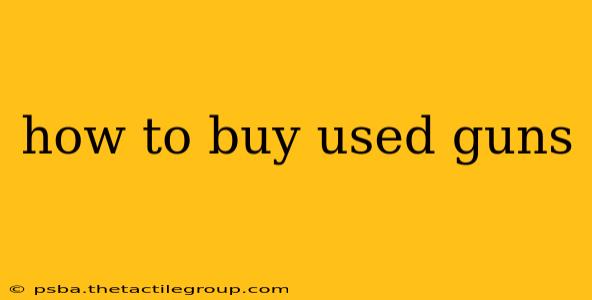Buying a used firearm can be a great way to save money and acquire a quality weapon. However, navigating the process safely and legally requires careful attention to detail. This comprehensive guide outlines the essential steps, emphasizing safety and compliance with all applicable laws.
Understanding the Legalities: Federal and State Laws
Before you even begin browsing listings, understanding the legal framework surrounding used gun purchases is crucial. Federal laws, such as those enforced by the Bureau of Alcohol, Tobacco, Firearms and Explosives (ATF), dictate certain aspects of firearm transactions. However, state laws vary significantly. Your state's specific regulations regarding background checks, waiting periods, permitted firearm types, and age restrictions will heavily influence your purchase.
It's absolutely paramount to research your state's specific laws before attempting any purchase. Failing to do so could lead to serious legal consequences. Consult your state's attorney general's website or a qualified legal professional for definitive information.
Finding a Reputable Seller: Where to Look and What to Avoid
Finding a reliable seller is key to a safe and successful purchase. Here are some avenues to explore:
Reputable Options:
- Licensed Dealers: Purchasing from a licensed firearms dealer offers the most protection. They're obligated to conduct background checks through the National Instant Criminal Background Check System (NICS), ensuring legal compliance. They often provide a warranty or guarantee on the firearm's functionality, offering some level of recourse if issues arise.
- Gun Shows: While gun shows offer a wide selection of used firearms, exercise extreme caution. Not all sellers at gun shows are licensed dealers, so due diligence is crucial. Always verify the seller's legitimacy and ensure they comply with all legal requirements.
- Online Forums and Classifieds (with caution): Online platforms can offer deals, but proceed with extreme care. Only deal with sellers who have positive reviews and a verifiable history. Always meet in a public place, preferably with a friend, for in-person inspections and transactions. Never ship a firearm without understanding the legal ramifications.
Red Flags to Watch Out For:
- Unreasonably Low Prices: Be wary of deals that seem too good to be true. This could indicate a stolen firearm or other legal issues.
- Lack of Paperwork: A seller unable or unwilling to provide documentation, such as proof of ownership, should raise a significant red flag.
- Hesitation or Evasion: If the seller seems reluctant to answer questions or provide details about the firearm's history, it's best to walk away.
- Private Sales Without Background Checks (where legally required): In many jurisdictions, private gun sales require background checks. Ignoring this requirement is both illegal and dangerous.
Inspecting the Firearm: A Detailed Checklist
Before completing any purchase, thoroughly inspect the used gun. This critical step helps identify potential problems and ensures the firearm is in safe working order.
Key Areas to Inspect:
- Overall Condition: Check for signs of rust, damage, or wear and tear.
- Bore Condition: Examine the barrel's interior for any damage or obstructions.
- Action Function: Carefully cycle the action (if applicable) to check for smooth operation.
- Safety Mechanisms: Ensure all safety mechanisms function correctly.
- Serial Number: Verify the serial number against any documentation provided.
- Test Fire (if possible): If the seller allows it, and it's legally permissible, test fire the firearm under safe conditions to confirm its functionality. Always wear appropriate hearing and eye protection.
Completing the Purchase: Documentation and Safety
Once you've inspected the firearm and are satisfied with its condition, carefully complete the transaction.
Crucial Documentation:
- Bill of Sale: Obtain a written bill of sale detailing the firearm's description, serial number, purchase price, and both buyer and seller information.
- Background Check (if required): Comply with all legal requirements, including background checks, waiting periods, and any necessary registration.
- Proof of Ownership (from the seller): Request and retain documentation proving the seller's legal ownership of the firearm.
Safe Handling Practices:
- Transporting the Firearm: Transport the firearm unloaded, in a secure case, and in compliance with all applicable laws.
- Storage: Store the firearm securely, unloaded, and out of reach of unauthorized individuals.
Buying a used gun requires diligence, caution, and a thorough understanding of the law. Following these steps will increase the likelihood of a safe, legal, and successful purchase. Remember: always prioritize safety and legal compliance above all else.

